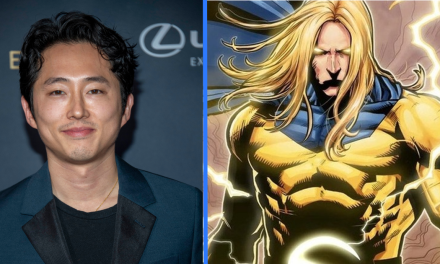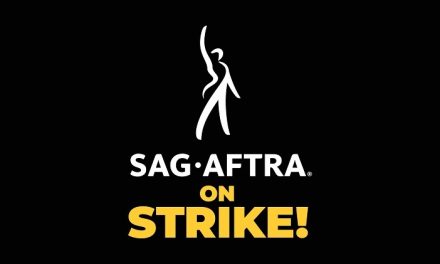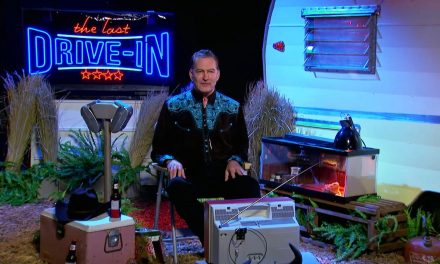Part apocalyptic horror monster flick, part political satire, part soapy drama, Rumours might be unlike anything you’ve seen before. The film follows the seven leaders of the world’s wealthiest democracies at the annual G7 summit, where they attempt to draft a provisional statement regarding a global crisis. But when night falls, crafting the perfect statement is no longer their only obstacle.
Rumours comes from a trio of writer-directors: Guy Maddin, Evan Johnson, and Galen Johnson. We sat down with the team to discuss the making of the feature, the significance of bog people, and more. Check out our full interview below.
THS: When you first envisioned Rumours, what made you decide to create a film that was both a political satire and a monster movie?
Evan Johnson: For us, it had to be both. Maybe our hearts weren’t in making a political satire entirely, and our hearts were not in making a monster movie entirely. Our hearts are in cramming them all together and hoping that something new comes out. We get really excited about mixing genres, hybridizing genres and things.
I think we all like the viewing experience where we don’t know what genre a movie is in or what it’s supposed to be. Those are my favorite type of movie experiences. I go in and for 10 or 15 minutes, I’m like, what is this? Is this a movie? What am I watching? What am I supposed to feel? I love that experience. You need to guide your viewers at some point. But that’s why having different genre tropes come in as signposts.
THS: Once you landed on including the supernatural… why bog people specifically?
Galen Johnson: We’d seen a documentary on bog people, years ago. And I think at first we just fell in love with their texture. Like we saw an archaeologist lifting up a bog person and putting it on a gurney, and it just looked like it was made out of Jello; it was just so disgusting. So we had these bog people, in our heads, waiting to put them to use somewhere, and we had this idea to do a G7 movie. And in our research about bog people, we had seen that it’s speculated that they were possibly leaders sacrificed for a bad harvest or something. So all of a sudden there was a good parallel there that we could exploit.
Guy Madden: Also, when I first discovered these bog people through these guys, the idea that their fingerprints are preserved after 2,000 years, and that their last meal can be analyzed… I’ve always been obsessed with the past and trying to understand the past. Something that was really almost chilling to me, that there were these people, these mysteriously preserved people that you could understand in ways you couldn’t understand any other in the past. So that was personally thrilling, but the fact that they might be leaders holding up a weirdly preserved past to these contemporary leaders sealed the deal for us.
Evan: Yeah, they’re leaders and maybe also at the same time victims. So they’re an ambiguous threat. They can stand in as a mirror of the leaders in our movie or they can stand in as the victims of the leader, the policies of the leaders. I never thought of them as one thing necessarily.
THS: Tell me about the casting process for your G7 world leaders.
Evan: We wrote the part of the Canadian Prime Minister somewhat based on just a funny idea we had in our head of what Roy [Dupois] might be like. Now Roy doesn’t run off crying or anything like that, like our Canadian Prime Minister does, but he is pretty intense. He seems brooding when you work with him. As Canadians, there’s just something funny about producing a really intense kind of romantic alpha male and making that character Canadian. Making him act like he’s the leader of all the other nations, because Canada is not a leader of the other nations at all.
THS: And then you have Charles Dance as the US President, another unconventional choice.
Evan: Yeah. The fact that Charles Dance, who’s obviously a British man, and obviously is playing a British man. We didn’t have him do an American accent. We refused to let him do an American accent. It was just one of our early ideas. In a way, it was like a tuning fork. A way of saying, this is the level of realism the movie is operating on. The American president has a British accent. It’s time to accept that, and move on. Good luck trying to read that as an allegory. I mean, you may be able to. America and Britain have history together. But for us, I think it was just a statement of intent in a way, starting up the movie with something that digresses from reality right away.
Guy: If there’s tons of meaning in it, it didn’t take us any work to put it there.
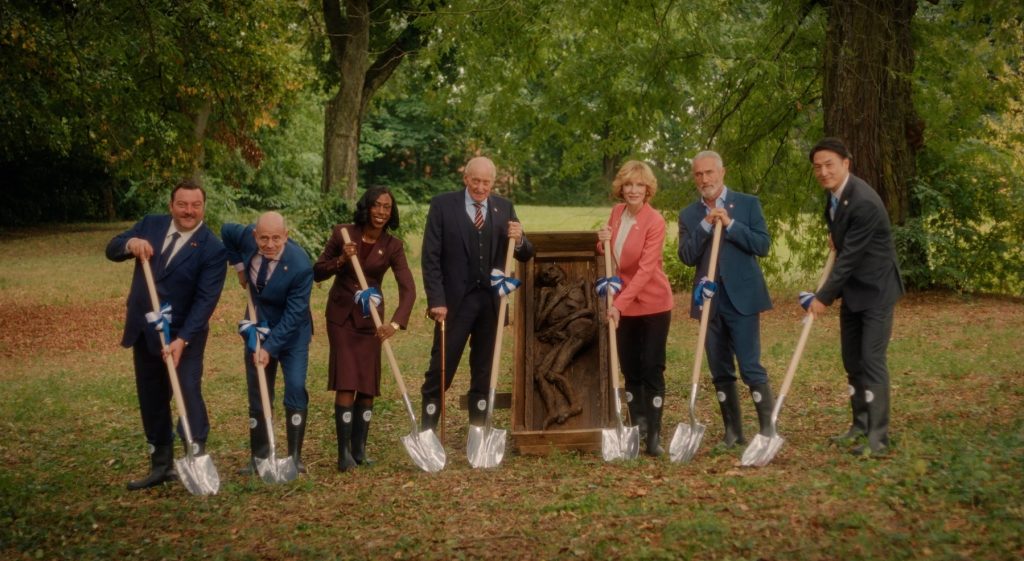
THS: Throughout the film, the G7 leaders are trying to collaborate on a provisional statement. How did you come up with the points they proposed for the statement? And did you brainstorm any that didn’t make the final cut?
Evan: That’s a good question. We know what group exercise writing is because we’ve done it. And you just come up with some bad stuff sometimes, some embarrassing stuff. I remember distinctly classes at university where I would be writing in a group, and you could see that there was a group on the other side of the room and they were doing, amazingly. Their group was so smart, so great. Your group sucked and couldn’t think of anything. I mean it’s easy to identify with this. These are just writer anxieties. And there’s a lot of those writerly anxieties in the movie. This is what the subject of the movie is in a lot of ways.
So some of the ideas are based on, we wanted a variety of failures. There’s even a scene in the movie where the writing seems to be going well between the French president and the Japanese president. They’re writing their brainstorming session and according to them, it seems to be really productive. But according to us, the viewer, it seems to have dubious merit maybe in the actual content.
Guy: Yeah, and sometimes the leaders err on the side of just revealing far too much about their private lives. Which happens when you’re writing. Watching somebody go, Whoops, did I just say that?
Galen: And then the deadline arrives and all your ideas, good or bad, have to go into it because it’s the deadline. And we really identified with that too. Okay we’ll take the giant brain and the AI chatbot and then present it to the audience and see what they say.
THS: Beyond scripting the writer struggle, there’s some fun visual gags in Rumours too – like IKEA-style instructions for taking a cyanide pill. Do you have any favorite visuals that the audience can look out for?
Evan: I think that was our art director John’s idea.
Guy: I hate looking at instructions.
Evan: The obvious visual I like the most is the giant brain. We were just pleased with it, and it’s hard to miss. Unless you go to the bathroom during the two scenes that it pops up I guess.
Guy: They built it so beautifully.
Evan: It was a stunning job done by our production designer on that giant brain. Because it sounds easy to build a giant brain. But to get it to look both giant and realistic… But this one, it ticks both boxes.
Galen: There was a visual gag that we ended up not having in the film, but we had the art department create anyways. The Jonas Glob character had a bunch of antivirus software on his desk.
Guy: We just thought that was funny. The AI chatbot is taking over the world, and your ineffectual EU leader is trying to fix it with some McAfee 1990s antivirus software.
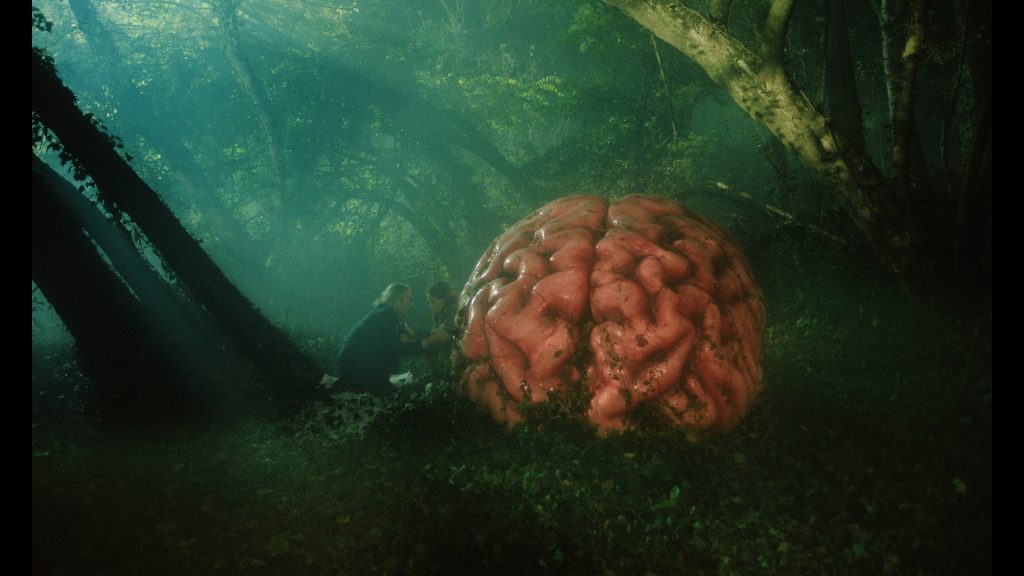
THS: Finally, what scene from the film would you each say you’re most proud of?
Galen: We haven’t really talked about this before, but Evan and I share a favorite scene. The French President being carried by the Canadian Prime Minister. It’s just a sort of close up on Denis [Ménochet’s] face. And there’s an intense amount of emotion in his face that you’re not quite sure what the emotion is. You just know it’s intense and the music is very sad and the background is weird. You can tell he’s not walking because the trees are at different angles, and then you cut to a low angle view of Roy, and then a wider shot of both of them, and then it’s Roy carrying Denis, and I just always found that scene funny and beautiful. And the beautiful doesn’t undermine the funny, and the funny doesn’t undermine the beautiful, so that was for me a highlight, among others.
Evan: Yeah, and I think for me, the writing of that scene was probably the most directly emotional I felt. Or the most personal I was being, with what was being said. So that seems a highlight. I also like the early scenes in the gazebo; I’m just happy mostly ’cause it’s all seven actors and they’re nailing it. It was just a thrill to see it turn out… It’s my Dinner with Seven Andres.
Guy: Mine’s maybe an obvious one. I love it when the Canadian Prime Minister discovers his true love Alicia Vikander shredding documents behind a giant brain. The music just swells so nicely, and they’re connecting, and it’s melodramatic, and in a way where the alchemy’s working between music and image, and the casual offhanded regard of the giant brain. Celestine, what are you doing here with this giant brain? It’s all just working there for me, it feels good to watch that.

![‘Rumours’ Writing/Directing Team Talk Blending Politics, Writing Anxiety, and Monsters [Interview]](https://thathashtagshow.com/wp-content/uploads/2024/10/project_20241023_1158429-01-1280x640.png)
